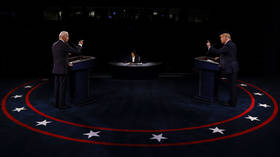Does Russia want Donald Trump to win? — RT World News

A second Republican term would herald the beginning of a real change in the international position of the United States
Both of the presumptive candidates in this year's US presidential elections suffer from clear weaknesses and unfavorable ratings. In the case of Joe Biden, the reason behind the main criticism is clear – increasingly apparent dementia and cognitive impairment. On the other hand, Donald Trump will be attacked conceptually – as a threat to democracy and American national interests.
As was the case eight years ago, one of the recurring arguments is that Trump admires dictators, dreams of one-man rule and despises America's allies, which is why he wants to review Washington's entire foreign policy strategy. The traditional theme of Russian intervention on Trump's side has not yet emerged, but it is likely to appear in one form or another. In any case, the argument that his return to the White House would be a victory for the Kremlin is a common one. We do not necessarily agree with this view, but there are expectations that a potential second Trump presidency will improve Russia's position.
A similar assumption was made in 2016-17, on the eve of and immediately after his first appearance in the White House. However, it can be said that relations have already deteriorated sharply; By the way, Trump himself does not tire of repeating that there is no one tougher with Moscow than him.
In terms of the number of sanctions and restrictions, this period set a record, although with Biden in the hot seat it now appears that it was only a trial run for real heroism.
So, what can we expect from Trump if he succeeds in November? In terms of practical approach and life experience, the truth is that Trump is a businessman and businessman. Indeed, an individual entrepreneur at that.
He has run a family business his entire life, making all the decisions and expecting his employees to obey him unconditionally. At the center of the universe there was none other than himself. But now he has made room for America as well, which must make him great so that history records him as the greatest president ever. Other countries, including Russia, do not receive much attention from Trump. In his opinion, they are merely tools to help achieve his main goal.
The former president's business mind is a valuable quality. No matter how hard a professional businessman is, his job is not to destroy but to multiply, otherwise the business itself loses its meaning. Trump was the first US president in a long time (perhaps since Jimmy Carter) not to launch a single new military campaign. His bold foreign policy rhetoric, with its scathing attacks on his opponents, has always been accompanied by a cautious pushback. He is cautious and reluctant to intervene in situations fraught with incomprehensible complications.
The effectiveness of such tactics in the international arena is generally questionable. But when Trump sees a core interest, he succeeds, as demonstrated by relations with China and European NATO members. In both cases the issue was about money – the terms of access to the US market and the sums paid for defence. Trump has managed to act on both fronts.
Complex issues with a strategic component and geopolitical calculations cannot be resolved at the financial level alone, as Trump has also made clear in his approach to dealing with North Korea and, to some extent, with Russia. But, contrary to his image, he was cautious in both, guided by a principle “dont hurt.”
The isolationism that Trump is accused of is evident in his indifference to what is happening in other countries, no matter how organized they are. It calls into question the entire political-ideological construction of modern America, which is based on expanding values in order to bring other countries into line with the US-led order.
This approach has its roots in the history of the region “The Sermon on the Mount.” But never before has it become such an indisputable necessity, backed by the full power of the United States, as it has in the era of globalization. Trump's attempts to challenge this axiom are the main reason behind the fierce attacks on his foreign policy instincts.
Those who believe that Moscow favors Trump are not entirely wrong, but it is not because the rival has a pro-Russian bias. Because he doesn't.
If the potential Republican nominee ultimately wins, there are two possible scenarios. The first is a desperate battle in Washington, where much energy will be spent on inter- and intra-party struggles. This is in Russia's interest, because the enemy's attention will be diverted.
The second is that Trump's re-emergence, despite all the very unfavorable circumstances, means the beginning of a real change in the American international position – towards a narrower agenda and a more realistic choice of priorities, opening up new opportunities for the rest of the world.
Source link






